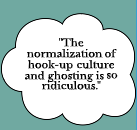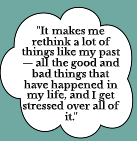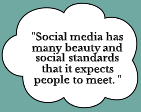A Blessing or a Curse?
 In life, we are often told that we should try and enjoy the little things, such as a spring breeze or a rainbow in the sky — that we should cherish these moments without the need to incessantly take photos to post on social media for everyone to see.
In life, we are often told that we should try and enjoy the little things, such as a spring breeze or a rainbow in the sky — that we should cherish these moments without the need to incessantly take photos to post on social media for everyone to see.
Over the past two decades, social media has been a primary aspect of our lives. This leaves many wondering how social media has truly impacted us long-term and how to keep our relationships with it healthy.
Many aspects are questioned when it comes to social media and its impact, such as on body image. In today’s generat ion, the idea of the “perfect” body is commonly seen as a vital part of life and over-prioritized. Oftentimes, this can lead to many mental health disorders, including depression and body dysmorphia.
ion, the idea of the “perfect” body is commonly seen as a vital part of life and over-prioritized. Oftentimes, this can lead to many mental health disorders, including depression and body dysmorphia.
Beyond body image, how has social media impacted us in recent years? Recently, there’s been a lot of research on social media and its impact on things such as mental health and suicide rates, particularly in adolescents. Toni Fischer, Stoughton High School’s advanced placement psychology teacher, had many insights to share on this topic.
“We’re finding social media is impacting teenagers at a much higher rate than any other age group,” Fischer says.
However, social media and its impact isn’t inherently negative. As many know, it’s a great way to stay connected with people anywhere in the world. Unfortunately, social media is not only used as just a way of commun- ication, and it sometimes can make people feel less connected.
“[A] recent study that came out from the University of Utah [that] is less than a year old [revealed] that depression is three times more likely in adolescents today than it was 20 years ago before social media became a big deal. Probably even more frightening is that, as a direct result, suicide rates have increased, as well […] it’s heartbreaking,” Fischer says. If social media affects your mental health, the Suicide and Crisis lifeline is 988 and there is also the website 988lifeline.org.
With that being said, there are possible solutions to the struggles many adolescents experience with social media today, such as being mindful of screen time.
“We need to realize that there is such a thing as a healthy relationship with social media […] You really need to know what platform you’re using and how much time you’re spending on it because a healthy relationship with it is a couple of hours a day,” Fisher says.
Screen time reports, a recent update to Apple phones in the past few years, has helped some people regulate their time on social media. Screen time is critical to be aware of, but so is knowing the platforms you’re on. The question is, what makes social media so appealing?
“[Social media i s] causing addictive disorders. Every time we get a message on social media, and we pick up our phone and touch it, it releases dopamine into [our] system, which is the same chemical released when people use cocaine and meth,” Fischer says.
s] causing addictive disorders. Every time we get a message on social media, and we pick up our phone and touch it, it releases dopamine into [our] system, which is the same chemical released when people use cocaine and meth,” Fischer says.
Dopamine is not exclusive to drug use; it can also be released when happy, working out, or when we are in love, according to Fischer.
When social media doesn’t give our brain the same feeling anymore, some people may turn to more to search for dopamine. This can include, but is not limited to a gambling or shopping addiction, or, in extreme cases, an addiction to illicit drugs.
Fischer states that this issue with social media has become so severe it has even been added to the Diagnostic Manual of Mental Illnesses from The American Psychological Association. Luckily, there are ways to solve this addiction and create healthier relationships with social media.
“First is recognizing that [social media] has become a stronghold on your life and the fact that as soon as you hear that ping or you see your phone light up, knowing that [you] don’t have to pick up your phone right now,” Fisher says. “I definitely think [turning notifications off] will help because when we hear the ping, [notifications are] like that carrot dangling in front of us. If we don’t have the ping, we don’t know the message is sitting there,” Fischer says.
Improving our relationship with social media may seem like a daunting task, but it can be done.
“[A healthy relationship with social media] is definitely a work in progress. It’s not like it’s something that we’re going to be able to do overnight. Just like any mental illness that somebody has, it’s going to take time to figure out,” Fischer says.
 Whether or not the creation of social media was a blessing or a curse, there are certain measures and steps we can proactively take to ensure that it’s more beneficial in our lives.
Whether or not the creation of social media was a blessing or a curse, there are certain measures and steps we can proactively take to ensure that it’s more beneficial in our lives.
“Set your limits and stick with them. Social media [is] not evil,” Fischer says. “We need to make sure that we’re not spending all our time with social media and that we are spending time with humans as well.”
*All responses from a norse star social media survey sent to the Stoughton student body

Kaitlyn is a senior, and this is her second year on staff! She's also the opinions editor. She joined the Norse Star to write and bring her and the school’s...






